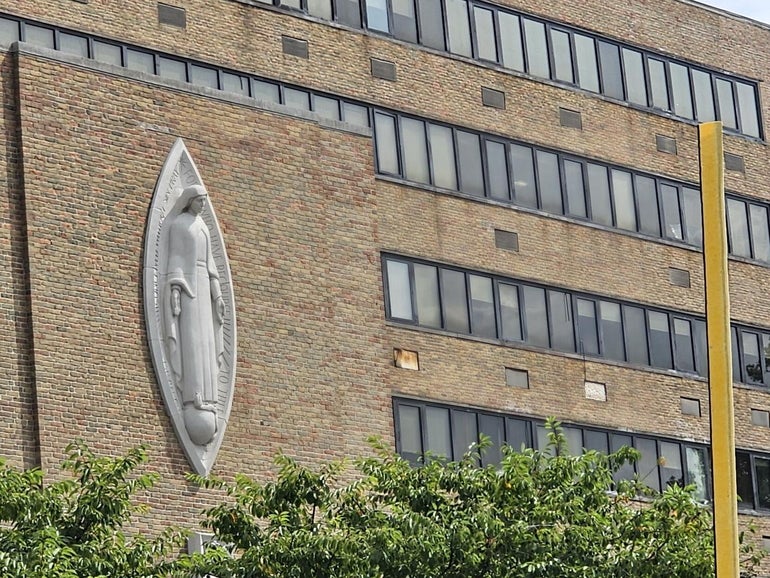Health Policy Commission: Mass. healthcare spending rises 5.8%, outpacing household income growth
 Photo I Craig Sandler/State House News Service
Outside the now-shuttered Steward Health Care-owned Carney Hospital in Dorchester
Photo I Craig Sandler/State House News Service
Outside the now-shuttered Steward Health Care-owned Carney Hospital in Dorchester
Health care spending in Massachusetts continued to grow faster than household incomes, according to new research, fueling concerns about access to care even before accounting for more recent upheaval inflicted by Steward Health Care's bankruptcy.
The latest annual health care cost trends report from the Health Policy Commission found that total health care expenditures per capita climbed to $10,264 in 2022, the first time it crossed into five figures and a 5.8 percent increase over 2021. Total spending on health care in Massachusetts raced past $70 billion, bounding from $67.8 billion in 2021 to $71.7 billion in 2022, the HPC said.
That's the second-highest year-over-year growth rate since the creation of the HPC a decade ago, lagging only the period from 2020 to 2021, which experts described as an outlier because of a "rebound" in spending after the start of the COVID-19 pandemic.
"Across all categories of care, the dominant factor driving this growth was higher prices, not more care being provided," the HPC said alongside its report published Thursday.
Beneath the topline trend, analysts cited a range of data points that show growing strain on Bay State families.
Massachusetts has the second-highest family health insurance premiums in the country, and the average annual cost of health care for a family is more than $29,000 when including out-of-pocket spending, the HPC said. The number of privately insured Bay Staters who did not receive needed health care due to costs increased 50 percent in two years, from 600,000 in 2021 to 900,000 in 2023. Businesses are struggling with costs, too, and are turning to high-deductible plans to limit premium increases, according to regulators.
"Addressing health care affordability in a meaningful way will be necessary to meet the Healey-Driscoll Administration's goal of making the Commonwealth more economically competitive for families and businesses to stay and thrive," the HPC wrote. "These challenges require bold action to move the health care system from the status quo to a new, more affordable, sustainable, and equitable trajectory."
Much of the growth in health care spending was driven by higher prices on the commercial side. Commercial health care spending per insurance member increased 5.2 percent in Massachusetts from 2019 to 2022, a higher rate than the national average in the same span or the concurrent change in the state's median family income, the HPC said.
Experts also pointed to pharmacy spending as an area fueling the broader trend. From 2017 to 2019, pharmacy spending per enrollee grew by 0.7 percent per year; in the following three-year period from 2019 to 2022, it shot up 8.2 percent per year, according to the HPC.
"Pharmacy spending trends have been one of the greatest drivers of health care spending in recent years in Massachusetts," said HPC Executive Director David Seltz. "Given what we've seen with uptake of some of these new blockbuster drugs, as well as the entry of very high cost new drug therapies [and] gene therapies, I think we can expect to see that that trend will continue."
Regulators dedicated new attention in the latest report to the collapse of Steward Health Care, even though the most recent cost trends data through 2022 do not capture the system's bankruptcy that unfolded this year.
Instead of renewing many of the recommendations from last year's report -- which lawmakers so far have not adopted -- the HPC this time around focused its suggestions on protecting the state from a repeat of the Steward crisis.
Regulators called for lawmakers to expand oversight tools, especially by subjecting more transactions to review by the HPC; strengthen transparency requirements that Steward allegedly flouted; better protect communities historically underserved by health care; and tackle pressure points like inequities in provider prices.
"Together, this is a very strong package of reforms that, if passed and implemented, would be an incredibly bold step forward that would put us as a commonwealth in a much stronger position to be able to protect our system and to plan for a better system moving forward," Seltz said.
Contributing to the long-running debate over more or less government regulation, HPC leaders for years have been asking lawmakers to grant them more regulatory muscle to expand their reviews and more forcefully turn the tide on cost growth.
The House and Senate each approved major health care oversight reform legislation this year, but top Democrats have so far been unable to forge a compromise bill featuring protections that lawmakers said would prevent another Steward crisis from happening.
One question Thursday from a commissioner, MetroWest Health Foundation President Martin Cohen, touched off a polite disagreement between Seltz and the Healey administration's health care chief.
Reflecting upon the Steward-inspired recommendations, Cohen asked what kinds of systems other states have in place. "I don't get the feeling that we're at the forefront here," he said.
"As I look through this list, I can think of at least a few states on each one of these that have gone further than Massachusetts," Seltz replied. "I think it is a fair assessment to say we are no longer a leader in many of these topics."
Health and Human Services Secretary Kate Walsh disagreed.
"I think people have elements of it, but not the whole part," Walsh said. "They might be stronger on physician practices -- I think of California in that way. My read ... is that people were looking to how Massachusetts is doing this, even in light of the Steward challenges, which other states are dealing with as well. So I think we're kind of ahead."
A landmark 2012 cost containment law set a "benchmark" target for how much health care spending should grow each year in Massachusetts, and created the HPC to monitor many of the state's health care dynamics.
While there were year-to-year fluctuations, cost growth kept closer to the state-set goal at the outset. Average spending grew 3.4 percent per year from 2012 to 2017, a shade below the 3.6 percent benchmark.
But from 2017 to 2022, the average annual growth climbed to 4 percent, surpassing targets in that span -- and the latest data show the second-highest annual increase to date.
Other reports from state agencies and watchdogs have also warned recently about increasing pressure in the health care sector. More than four in 10 non-Steward hospitals reported negative operating margins through a significant portion of the fiscal year.
"This is a time of seismic change for Massachusetts healthcare, and -- as data from [the Center for Health Information and Analysis] and HPC has made resoundingly clear -- our patients and providers are the ones feeling the biggest aftershocks," Mass. Health and Hospital Association President Steve Walsh said Thursday. "We look forward to testifying at the HPC hearing next month about how these enormous pressures, which extend far beyond the Steward crisis, are impacting every corner of care delivery in the commonwealth."







0 Comments